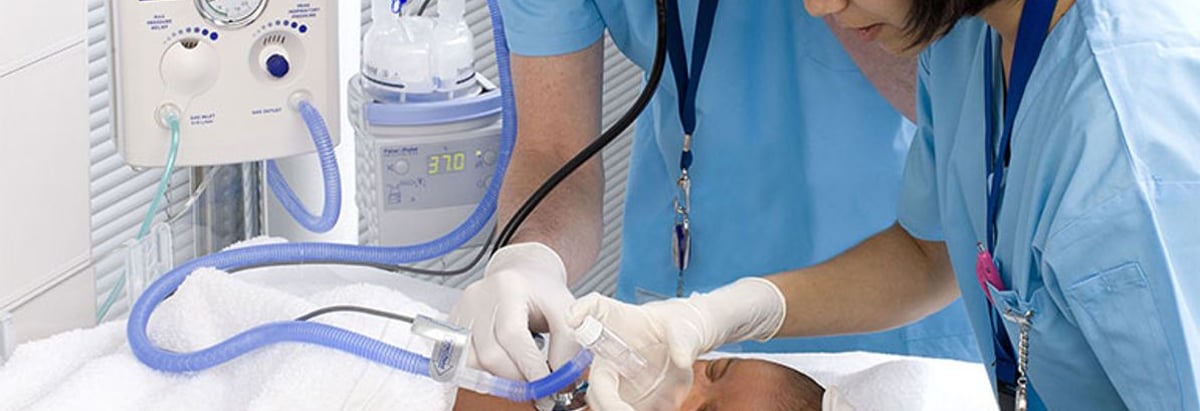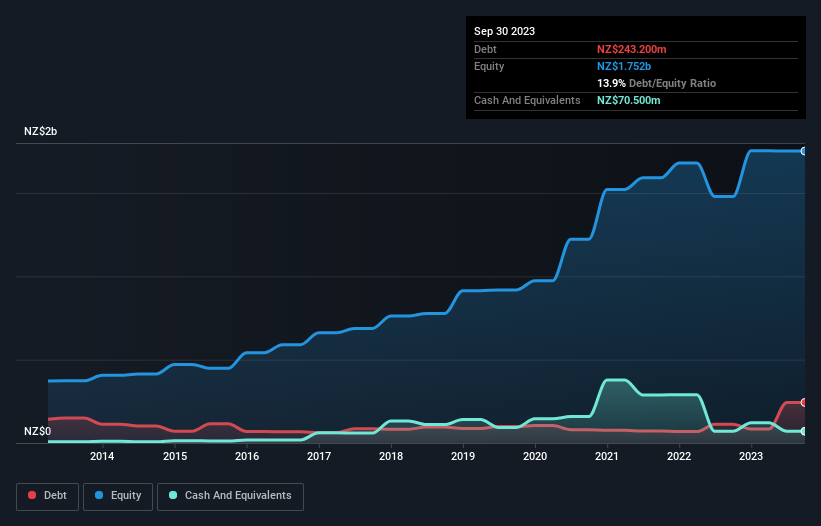
Howard Marks put it nicely when he said that, rather than worrying about share price volatility, 'The possibility of permanent loss is the risk I worry about... and every practical investor I know worries about.' So it might be obvious that you need to consider debt, when you think about how risky any given stock is, because too much debt can sink a company. We can see that Fisher & Paykel Healthcare Corporation Limited (NZSE:FPH) does use debt in its business. But the more important question is: how much risk is that debt creating?
Why Does Debt Bring Risk?
Debt and other liabilities become risky for a business when it cannot easily fulfill those obligations, either with free cash flow or by raising capital at an attractive price. Part and parcel of capitalism is the process of 'creative destruction' where failed businesses are mercilessly liquidated by their bankers. However, a more common (but still painful) scenario is that it has to raise new equity capital at a low price, thus permanently diluting shareholders. Of course, plenty of companies use debt to fund growth, without any negative consequences. When we think about a company's use of debt, we first look at cash and debt together.
See our latest analysis for Fisher & Paykel Healthcare
What Is Fisher & Paykel Healthcare's Net Debt?
You can click the graphic below for the historical numbers, but it shows that as of September 2023 Fisher & Paykel Healthcare had NZ$243.2m of debt, an increase on NZ$112.4m, over one year. However, it also had NZ$70.5m in cash, and so its net debt is NZ$172.7m.

How Strong Is Fisher & Paykel Healthcare's Balance Sheet?
According to the last reported balance sheet, Fisher & Paykel Healthcare had liabilities of NZ$286.8m due within 12 months, and liabilities of NZ$351.2m due beyond 12 months. Offsetting this, it had NZ$70.5m in cash and NZ$261.9m in receivables that were due within 12 months. So its liabilities outweigh the sum of its cash and (near-term) receivables by NZ$305.6m.
This state of affairs indicates that Fisher & Paykel Healthcare's balance sheet looks quite solid, as its total liabilities are just about equal to its liquid assets. So while it's hard to imagine that the NZ$15.4b company is struggling for cash, we still think it's worth monitoring its balance sheet. Carrying virtually no net debt, Fisher & Paykel Healthcare has a very light debt load indeed.
We measure a company's debt load relative to its earnings power by looking at its net debt divided by its earnings before interest, tax, depreciation, and amortization (EBITDA) and by calculating how easily its earnings before interest and tax (EBIT) cover its interest expense (interest cover). Thus we consider debt relative to earnings both with and without depreciation and amortization expenses.
Fisher & Paykel Healthcare's net debt is only 0.39 times its EBITDA. And its EBIT covers its interest expense a whopping 30.6 times over. So you could argue it is no more threatened by its debt than an elephant is by a mouse. The good news is that Fisher & Paykel Healthcare has increased its EBIT by 8.5% over twelve months, which should ease any concerns about debt repayment. There's no doubt that we learn most about debt from the balance sheet. But it is future earnings, more than anything, that will determine Fisher & Paykel Healthcare's ability to maintain a healthy balance sheet going forward. So if you want to see what the professionals think, you might find this free report on analyst profit forecasts to be interesting.
But our final consideration is also important, because a company cannot pay debt with paper profits; it needs cold hard cash. So we always check how much of that EBIT is translated into free cash flow. In the last three years, Fisher & Paykel Healthcare's free cash flow amounted to 27% of its EBIT, less than we'd expect. That weak cash conversion makes it more difficult to handle indebtedness.
Our View
Happily, Fisher & Paykel Healthcare's impressive interest cover implies it has the upper hand on its debt. But, on a more sombre note, we are a little concerned by its conversion of EBIT to free cash flow. It's also worth noting that Fisher & Paykel Healthcare is in the Medical Equipment industry, which is often considered to be quite defensive. Taking all this data into account, it seems to us that Fisher & Paykel Healthcare takes a pretty sensible approach to debt. While that brings some risk, it can also enhance returns for shareholders. Of course, we wouldn't say no to the extra confidence that we'd gain if we knew that Fisher & Paykel Healthcare insiders have been buying shares: if you're on the same wavelength, you can find out if insiders are buying by clicking this link.
Of course, if you're the type of investor who prefers buying stocks without the burden of debt, then don't hesitate to discover our exclusive list of net cash growth stocks, today.
If you're looking to trade Fisher & Paykel Healthcare, open an account with the lowest-cost platform trusted by professionals, Interactive Brokers.
With clients in over 200 countries and territories, and access to 160 markets, IBKR lets you trade stocks, options, futures, forex, bonds and funds from a single integrated account.
Enjoy no hidden fees, no account minimums, and FX conversion rates as low as 0.03%, far better than what most brokers offer.
Sponsored ContentNew: AI Stock Screener & Alerts
Our new AI Stock Screener scans the market every day to uncover opportunities.
• Dividend Powerhouses (3%+ Yield)
• Undervalued Small Caps with Insider Buying
• High growth Tech and AI Companies
Or build your own from over 50 metrics.
Have feedback on this article? Concerned about the content? Get in touch with us directly. Alternatively, email editorial-team (at) simplywallst.com.
This article by Simply Wall St is general in nature. We provide commentary based on historical data and analyst forecasts only using an unbiased methodology and our articles are not intended to be financial advice. It does not constitute a recommendation to buy or sell any stock, and does not take account of your objectives, or your financial situation. We aim to bring you long-term focused analysis driven by fundamental data. Note that our analysis may not factor in the latest price-sensitive company announcements or qualitative material. Simply Wall St has no position in any stocks mentioned.
About NZSE:FPH
Fisher & Paykel Healthcare
Designs, manufactures, markets, and sells medical device products and systems in North America, Europe, the Asia Pacific, and internationally.
Flawless balance sheet with reasonable growth potential.
Similar Companies
Market Insights
Community Narratives




